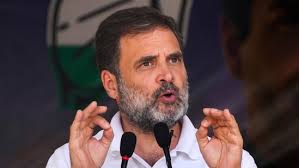Rahul Gandhi Clarifies Controversial "Ending Reservation" Remarks: What You Need to Know
Congress leader Rahul Gandhi's recent comments on "ending reservation" during his US visit sparked significant backlash. In his clarification, Gandhi emphasizes his commitment to social justice and addresses the misinterpretations of his statement. Read on to understand the context, reaction, and implications of this controversy on India's reservation system. Discover how Gandhi's remarks are shaping the debate on affirmative action and social equity in India.
LATEST NEWS


Rahul Gandhi Clarifies Controversial Comments on Reservation: What You Need to Know
In recent news, Congress leader Rahul Gandhi has found himself at the centre of a heated debate following his comments on "ending reservation" during his ongoing visit to the United States. The statement, which has stirred considerable backlash, has prompted Gandhi to issue a clarification. This blog delves into the controversy, the clarification, and the broader implications of the remarks. Let’s explore the context, the reaction, and what this means for India's reservation policy.
The Controversial Statement
While addressing an audience in the U.S., Rahul Gandhi made a statement that has ignited significant controversy back home. He suggested that the Congress party would consider "ending reservation" if India became a "fair place." This comment was intended to highlight the need for a fair and equitable society but, was quickly interpreted by many as a challenge to the existing reservation system in India.
Backlash and Misinterpretations
The response to Gandhi’s statement was swift and intense. Critics accused him of undermining the reservation system, which is designed to provide opportunities for historically marginalized communities in India. The reservation system, which includes affirmative action policies for Scheduled Castes, Scheduled Tribes, and Other Backward Classes, has been a cornerstone of social justice in India for decades.
Gandhi’s remarks were seen by some as dismissive of the struggles faced by these communities. This led to a wave of criticism from various political leaders, activists, and the public, who argued that the timing and context of his comments were inappropriate.
Rahul Gandhi's Clarification
In response to the backlash, Rahul Gandhi issued a clarification. He stated that his comments had been "misinterpreted" and, emphasized that his intention was not to advocate for the immediate end of reservation policies. Instead, he explained that he was speaking about a long-term vision of a just and equitable society where reservation may no longer be necessary if social disparities are fully addressed.
Gandhi reassured his audience that the Congress party remains committed to the reservation system and the principles of social justice it upholds. His clarification aimed to mitigate the misunderstanding and reinforce his commitment to addressing inequality through immediate and progressive measures.
Understanding the Reservation System
To fully grasp the implications of this controversy, it’s crucial to understand the reservation system itself. Implemented as part of India’s affirmative action policies, reservations are designed to ensure that marginalized communities have equal opportunities in education, employment, and political representation.
The system has been a subject of extensive debate, with proponents arguing that it is essential for correcting historical injustices and critics suggesting that it may perpetuate divisions and hinder merit-based progress. Rahul Gandhi's comments touch upon this ongoing debate, raising questions about the future of reservation policies and their role in a progressively equitable society.
The Broader Implications
This incident highlights the delicate nature of discussing reservation policies in India. The system is deeply intertwined with issues of identity, history, and social justice, making any remarks on the topic highly sensitive. Gandhi’s clarification aims to refocus the conversation on the need for a fair and just society, rather than the elimination of reservation policies.
As India continues to evolve socially and economically, the discourse on reservation will undoubtedly remain a notable issue. Political leaders, policymakers, and the public should engage in thoughtful discussions to address these complex issues while ensuring that the principles of equity and justice are upheld.
Rahul Gandhi’s recent comments and subsequent clarification have brought the reservation debate back into the spotlight. While his statement was initially met with strong criticism, his clarification seeks to address the misinterpretations and reaffirm his commitment to social justice. As this story continues to develop, it underscores the importance of clear communication and understanding in the discourse surrounding India's reservation policies.
Stay tuned for more updates and analysis on this evolving topic. For more insights into Indian politics and social issues, follow Tail Of Trends and join the conversation.
